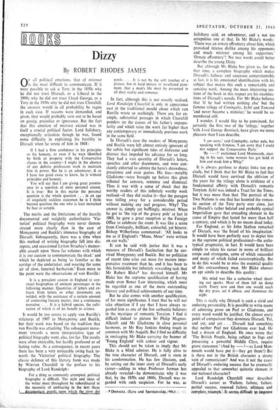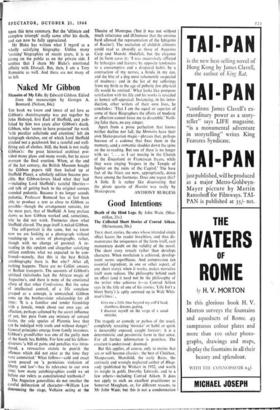Dizzy
MUO
By ROBERT RHODES JAMES
OF all political emotions, that of mistrust is the most difficult to communicate. If it were possible to ask a Tory in the 1850s why he did not trust Disraeli, or a Liberal in the 1900s why he did not trust Lloyd George, or a Tory in the 1930s why he did not trust Churchill, the answers would in all probability be vague in each case. If reasons were demanded, and given, they would probably turn out to be based on gossip, prejudice or ignorance. But the fact that this emotion of mistrust existed was in itself a crucial political factor. Lord Salisbury, exceptionally articulate though he was, found some difficulty in explaining his hostility to Disraeli when he wrote of him in 1868:
If I had a firm confidence in his principles or his honesty, or even if he were identified by birth or property with the Conservative classes in the country—I might in the absence of any definite professions work to maintain him in power. But he is an adventurer; & as I have too good cause to know, he is without principles and honesty. You will say that I am giving great promin- ence to a question of mere personal esteem. It is true: But in this matter the personal question is ,the whole question . . . in an age of singularly reckless statesmen he is I think beyond question the one who is least restrained by fear or scruple.
The merits and the limitations of the heavily documented and weightily authoritative 'Vic- torian' political biography were never demon- strated more clearly than in the case of Monypenny and Buckle's immense biography of Disraeli. Subsequently, there was a time when this method of writing biography fell into dis- repute, and occasioned Lytton Strachey's memor- able assault upon 'those fat volumes with which it is our custom to commemorate the dead,' and which he depicted as being 'as familiar as the cortege of the undertaker, and wearing the same air of slow, funereal barbarism.' Even more to the point were the observations of von Ruville: It is a prevalent custom in England to con- struct biographies of eminent personages in the following manner. Quantities of letters and ex- tracts from letters or other documents are welded, with the assistance of a certain amount of connecting literary matter, into a continuous narrative. . . . It is a hybrid species, the culti- vation of which is of no benefit to science.
It would be too severe to apply von Ruville's strictures of 1907 to Monypenny and Buckle, but their work was based on the tradition that von Ruville was attacking. The subsequent move- ment towards a more interpretative type of political biography went, alas, too far. The results were often enjoyable, but hardly profound or of lasting value. As a consequence, in recent years there has been a very noticeable swing back to- wards the 'Victorian' political biography. The classic defence of this literary form was made by Winston Churchill in the preface to his biography of Lord Randolph: For a thing so commonly attempted, political biography is difficult The style and ideas of the writer must throughout be subordinated to the necessity of embracing in the text those
L...flogumantary orpofs upon Milt tjte Story
pends. . . . It is not by the soft touches of a picture, but'in hard mosaic or tessellated pave- ment, that a man's life must be presented in all their reality and romance.
In fact, although this is not usually realised, Lord Randolph Churchill is only in appearance cast in the traditional mould about which von Ruville wrote so scathingly. There are, for ex- ample, substantial passages in which Churchill ponders on the causes of his father's unpopu- larity and which raise the work far higher than any contemporary or immediately previous work in the same field.
In Disraeli's case the readers of Monypenny and Buckle were left almost entirely ignorant of the subtle but significant tides of disfavour and distrust that impeded his advance for so long. They had a vast quantity of Disraeli's letters, speeches and other documents, and were con- stantly exhorted to admire the hero's shrewdness, prescience and even genius. His foes—notably Gladstone—were brought up before this glum tribunal for censure, sentence and dismissal. Thus it was with a sense of shock that the worthy readers of this infinitely worthy work realised—if they did realise it—that the paragon was toiling away for a considerable period without making any real progress. Why? The answer is, simply yet bafflingly, mistrust When he got to 'the top of the greasy pole' at last in 1868, he gave a great reception at the Foreign Office to celebrate the event. It was like a scene from Coningsby, brilliant, colourful, yet bizarre. Bishop Wilberforce commented: 'All looks to me as if England's "Mene, Mene" were written on our walls.'
It can be said with justice that it was a measure of Disraeli's fascination that he sur- vived Monypenny and Buckle. But no politician of recent time cries out more for mature inter- pretative treatment than he, and it has been to this formidable but infinitely rewarding task that Mr Robert Blake* has devoted himself. Mr Blake has the supreme qualification of having made even Bonar Law interesting, which must be regarded as one of the more outstanding literary and political achievements of our time.
But he also comes with another qualification, of far more significance. I trust that he will not take objection if I say that I have always re- garded him as one of the few authentic believers in the mystique of romantic Toryism. I find it difficult indeed to picture Sir Philip Magnus- Allcroft and Mr Gladstone in close personal harmony, or Mr Roy Jenkins finding much in common with Mr Asquith. But I find no difficulty in envisaging Mr Blake carrying the banner of 'Young England' with ardour and vigour.
This should not be taken to imply that Mr Blake is a blind admirer. He is fully alive to the true character of Disraeli, and is stern in his condemnation. He has few illusions, and, by setting out the inner story of Disraeli's early career—adding to what Professor Jerman has already revealed—he demonstrates why it was that, by the 1850s and 1860s, Disraeli was re- garded with such suspicion. For he was, as
Drsaterm., (Bype■and Spottiswoode„r908.) L I hi,
Salisbury said, an adventurer, and a not too scrupulous one at that. In Mr Blake's words: `There was an ornate effrontery about him, which provoked intense dislike among his opponents and much mistrust among his supporters.' 'Ornate effrontery'! No two words could better describe the young Dizzy.
But although Mr Blake has 'given us, for the first time, a complete biography which makes Disraeli's failures and successes comprehensible at last, it is his emotional identification with his subject that makes this such a remarkable and sensitive work. Among the most interesting sec- tions of the book in this respect are his examina- tions of Disraeli's novels. For Mr Blake believes that 'if he had written nothing else' but the famous trilogy of Coningsby, Sybil and Tancred 'and never become a minister,' he would be re- membered still.
I wonder. I would like to be convinced, for certainly the first two of the 'trilogy,' together with Lord George Bentinck, have given me more pleasure than I can describe.
am sorry.' said Coningsby, rather pale, but speaking with firmness, 'I am sorry that I could not support the Conservative Party.'
'By —!' exclaimed Lord Monmouth, start- ing in his seat, 'some woman has got hold of him and made him a Whig!'
It is always perilous to depict links too pre- cisely, but I think that for Mr Blake to feel that Disraeli would have survived the oblivion of the years for the trilogy alone is evidence of a fundamental affinity with Disraeli's romantic Toryism. Sybil was indeed a Tract for the Times, but it was more than that. The portrait of the Two Nations is one that has haunted the roman- tic section of the Tory party ever since, just as Disraeli's rather belated and probably cynical Imperialism gave that crusading element to the cause of Empire that lasted for more than half a century, and which is by no means dead today.
For England, as Sir John Skelton remarked of Disraeli, was 'the Israel of his imagination.' It would have been perfectly easy to depict him as the supreme political professional—the arche- typical pragmatist, in fact. It would have been simple to relate his career in terms of brilliant coups and strategems, some of which succeeded and many of which failed catastrophically. But to do this would be to miss the essential quality of this extraordinary man. Mr Blake chooses an apt simile to describe this quality:
His mind was like a catherine wheel shoot- ing out sparks. Most of them fell on damp earth. Every now and then one would reach the dry grass, set it ablaze. and illuminate the night.
This is really why Disraeli is such a vivid and enduring personality. It is possible to write reams of admiring prose on Peel or Gladstone, and every word would be justified. On almost every point of comparisori they dominate Disraeli. Yet, and yet, and yet . . . Disraeli had something that neither Peel nor Gladstone ever had. He had a dream of England. He once wrote that 'The British People, being subject to fogs and possessing a powerful Middle Class, require grave statesmen.' (And by —!—as Lord Mon- mouth would have put it—they get them!) But is there not in' the British character a strong vein of romanticism? And was it not the cause of Disraeli's enduring success that he eventually appealed to that somewhat quixotic element in our national character?
Lord Randolph Churchill once described Disraeli's career as 'Failure, failure, failure, partial success, renewed failure, ultimate and MITipletejrinmpb.!:It stunt difficAdt tn-imptoNe upon this terse summary. But the 'ultimate and complete triumph' really came after his death, and can now be fully appreciated.
Mr Blake has written what I regard as a wholly satisfying biography. Unlike many 'revising' biographies of recent years, it is as strong on the public as on the private side. I confess that I share Mr Blake's emotional affinity with Disraeli. But, then, I am a Tory Romantic as well. And there are not many of us left.



































 Previous page
Previous page